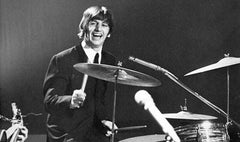
Mistakes make you a better artist. Seems ridiculous right? We all seek perfection, but if everything in life is about balance, you can’t have your high moments without your lows. Maintaining a career and happy life as a musician is about managing your mistakes as they come, and knowing how to use things that are labeled “wrong” to your advantage. Let’s look at how flaws can become another toolset for you to use for growth as a artist.
No Quantization = Feel and Groove
We have tools nowadays that will lock the timing of your notes to any rigid grid you choose. It’s great for new musicians learning the ropes, but so much of a musician’s individual style comes from how they play in the moment, and that feel gets lost the second you hit quantize. Playing in your own notes via midi controller, or using natural recordings from a kit allows the imperfections to nudge the timing back and forth and create a good groove. Some of hiphop’s elite producers like Pete Rock and Madlib swear by playing in their drums with a loose, intentionally off feel. This style became a trademark of their sound, and would have never surfaced if they weren’t willing to be imperfect when programming.

Is this Really a Mistake, or is it Just New?
It’s easy to label something as a mistake when it doesn’t achieve the result you’re used to. But using that logic, you can also look at a mistake merely as a path you haven’t walked down yet. You’ve labeled this path “wrong” because it’s uncomfortable to you, but anything that you haven’t done a lot will feel that way. If you’ve never driven an exotic $200,000 race car, odds are you’ll be uncomfortable if someone gave you the keys to one and you had to drive it to work immediately. With that said, I’m pretty sure you’d be willing to work through the uncomfortable moments to see where they take you! The same should apply here.
Mistakes Should be Saved and Revisited
It seems like torture to collect all of your flaws, but an infinite amount of classic records never get finished because people don’t develop their mistakes far enough. Sometimes you work on a theme, or try to design a sound and it doesn’t work out so you scrap it and start fresh, or cry and binge on youtube videos. Rather than abandoning the idea altogether, create a folder of “scraps” that contains patches, midi sequences, and audio samples that you would’ve abandoned. You might not have been ready to flesh the idea out fully just yet, but time and fresh ears can do wonders. Plus the next time writer’s block hits, you can scan through your folder of scraps and see if something can be tweaked and used as a starting point, or thrown into a song you're working on. Scrap folders also serve as great collaboration starting points. When working with someone new, you can give them a huge collection of rough ideas to start from

You’re Doing That Wrong. Keep Going
Whenever possible, it’s good to pick up an instrument and learn it with proper form and technique as a precedent. That said, some of the most iconic musicians have achieved their tone by playing their instrument contrary to the standard. Take Ringo Starr as a prime example. He recently discussed his process in an interview and claimed that a lot of the unique drum riffs he developed were the result of him essentially playing his kit “wrong”. He was born left-handed, but his grandmother disliked it and tried to train him to use his right hand instead. As a result, he's lefty despite learning and playing on a right handed kit. To compensate, he wrote patterns that he could play that were contrary the established norms. It’s safe to say, it worked.

Yesterday's Mistakes Mark Today's Progress
Whenever you feel like you’re in a bit of a rut in terms of progress, take a listen to old sessions full of mistakes and problems, and remind yourself of how far you’ve come. It’s easy to cringe at a flat note or stale song from your past, but if you can identify new mistakes it means you’ve improved as a musician. The second you can’t look back at your old work and find anything wrong, you may want to consider challenging yourself more.

6 Comments
The point about saving your mistakes is great… I keep all my work and when I don’t have inspiration I just listen back.. a lot of things I forgot I even did! That’s pretty cool. Also, yes, fragments are a much better way to collaborate oftimes than playing your new collaborator your “done and dusted” songs…
This is so encouraging especially when I just finished writing, recording & mixing & mastering a song in one month last month & the to find out it’s still not quite as good as what I hear on the radio. But there’s no question it’s better than my last song so I gotta learn from my mistakes & do better on my next song I’m gonna start in 2 weeks! Thanks again!
The biggest lesson I ever learned playing gigs was that if you make a mistake and really hit a clunker—just do it three more times in a row. Now it’s “intentional!”
excellent encouraging words from an up and coming sax man.
Thank you I really needed tht
That’s what I love about being an “old school” musician…there’s only one way to learn your instrument and that’s practice..practice and more practice. After all these years I still practice soloing/improvising because that’s the only way to do it..mistakes and all.